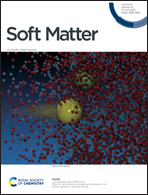Kinetics of colloidal particle deposition in microfluidic systems under temperature gradients: experiment and modelling†
Abstract
The deposition of colloidal particles can cause particulate fouling on solid walls and the formation of clogs during the transport of colloidal suspensions in microchannels. The particle deposition rate grows over time and blocks the microchannels eventually. The process of particle deposition is affected by various physicochemical parameters. In this paper, we investigate the effect of temperature gradient on the particle deposition of a pressure-driven suspension flow in a microchannel. We designed a microfluidic device which can allow direct observation of the real-time process of particle deposition with single-particle resolution along the direction of applied temperature gradient. The experimental results show that particle deposition rate is decreased by increasing the applied temperature gradients. Based on the framework of the Derjaguin–Landau–Verwey–Overbeek (DLVO) theory, we then derive a mass transport model to describe the particle deposition under different temperature gradients. The model shows that the observed reduction of particle deposition rate with temperature gradient is due to the collective effect of the temperature gradient and the bulk solution temperature in the two steps of the particle deposition process, including the particle transport and the particle attachment. Our work illustrates the critical effects of temperature gradients on the particle deposition in microchannels, and is expected to provide a better understanding of thermally driven particulate fouling and clogging in microfluidic devices.



 Please wait while we load your content...
Please wait while we load your content...